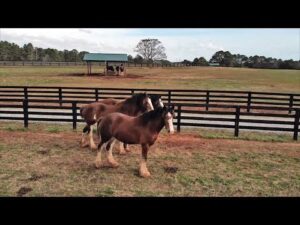
[Ray D’Alessio] Known for their massive size, stepping action and gentle temperament, the first breed of Clydesdales can be traced back to the 1800s in the farmlands of Scotland. For Shannon Martin, a native of Michigan, her affection for the breed began a little over 20 years ago. To this day, Shannon insists, there is no horse like a Clydesdale. [Shannon Martin – Owner, Classic City Clydesdales] These guys are the most kind, most forgiving animal on the planet. You can do things with a Clydesdale that you would definitely hesitate to do with other
breeds. I always say they’re the most kid-friendly, husband-safe horse there is. We got our first Clydesdale in 1998 and it was because my husband, who I had met, wanted to find a horse he could ride with me on the weekends. I had worked in high school with a lady who would go to horse auctions, buy unbroke prospects, break them, and resell them as riding horses. I always like to say I was her crash test dummy. So, on the weekends when I got out of the Air Force, I was riding a little 14 hand Cremello
pony, I have no idea what breed it was, and Mark decided he wanted to ride with me. So, we went to a horse auction, ’cause it’s what I knew. This was up in Jackson, Michigan, and in through the arena came a two-year-old Clydesdale stud colt, and he looked at it and said “That’s what I gotta have.” And at that time, I thought, “What in the heck are we gonna do with this thing?” Fast forward almost 20 years, and here we are with about 35 head of Clydesdale horses and I can’t imagine having any other breed.
[Ray D’Alessio – rdalessio@gfb.org] Typically, when one thinks of a Clydesdale they think of a workhorse of sorts, pardon the expression, a carriage ride, obviously pulling the Budweiser wagon, but according to Shannon, they’re much more than that. In fact, these animals are very versatile. [Martin] Are they workhorses? Sure, sure, that’s what their history was, but we’re making new history with them now. In fact, at our world show up in Madison, Wisconsin, in October was the first time we’ve introduced a dressage section to our world show.
So, we’re doing a lot more riding with these guys. They’re super versatile. Now, are they gonna be big jumpers? No, probably not. But you know that…take them out on a trail on the weekend? They love it. They have a great time with it. [Ray] Shannon admits raising Clydesdales is not for everyone, especially with the always changing climate here in Georgia. For one, they prefer colder temperatures. One of the reasons why Classic City is a rare find here in the Southeast. Additionally, their massive size requires some extra attention.
[Martin] It is kind of a joke here on the farm that I do, usually, give about a hundred reasons why somebody should not own a Clydesdale, compared to the one reason why they should. It’s not because I don’t want people to enjoy these horses, it’s just I really love them and I wanna make sure that they land in the best possible environment. The feather that’s on their legs definitely requires daily maintenance, you definitely have to watch that, it can be a source of illness and injury for them, and, they are
big horses, so they require an ample amount of feed to keep them comfortable. These aren’t a breed of horse that you just throw out to the pasture and bring in once a week for a trail ride. They definitely need that, that constant…. Hi. That constant interaction to stay happy and healthy. In the last couple of years since our barn fire in 2016 we realized that a lot of what we do is here. This is what we enjoy, we enjoy the babies, we enjoy the moms, and enjoy sharing them with the public. So, we did open up the farm to tours last year.